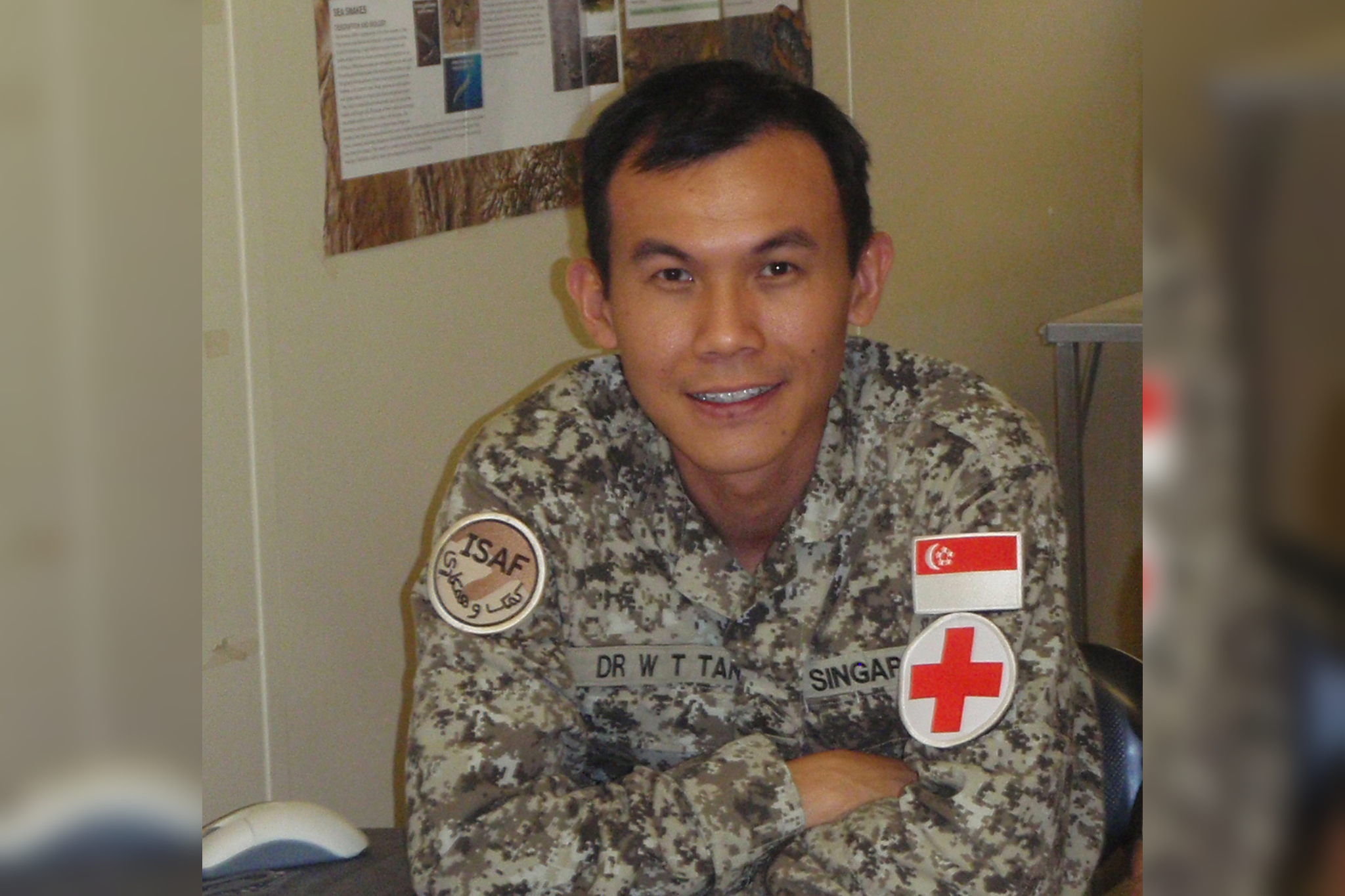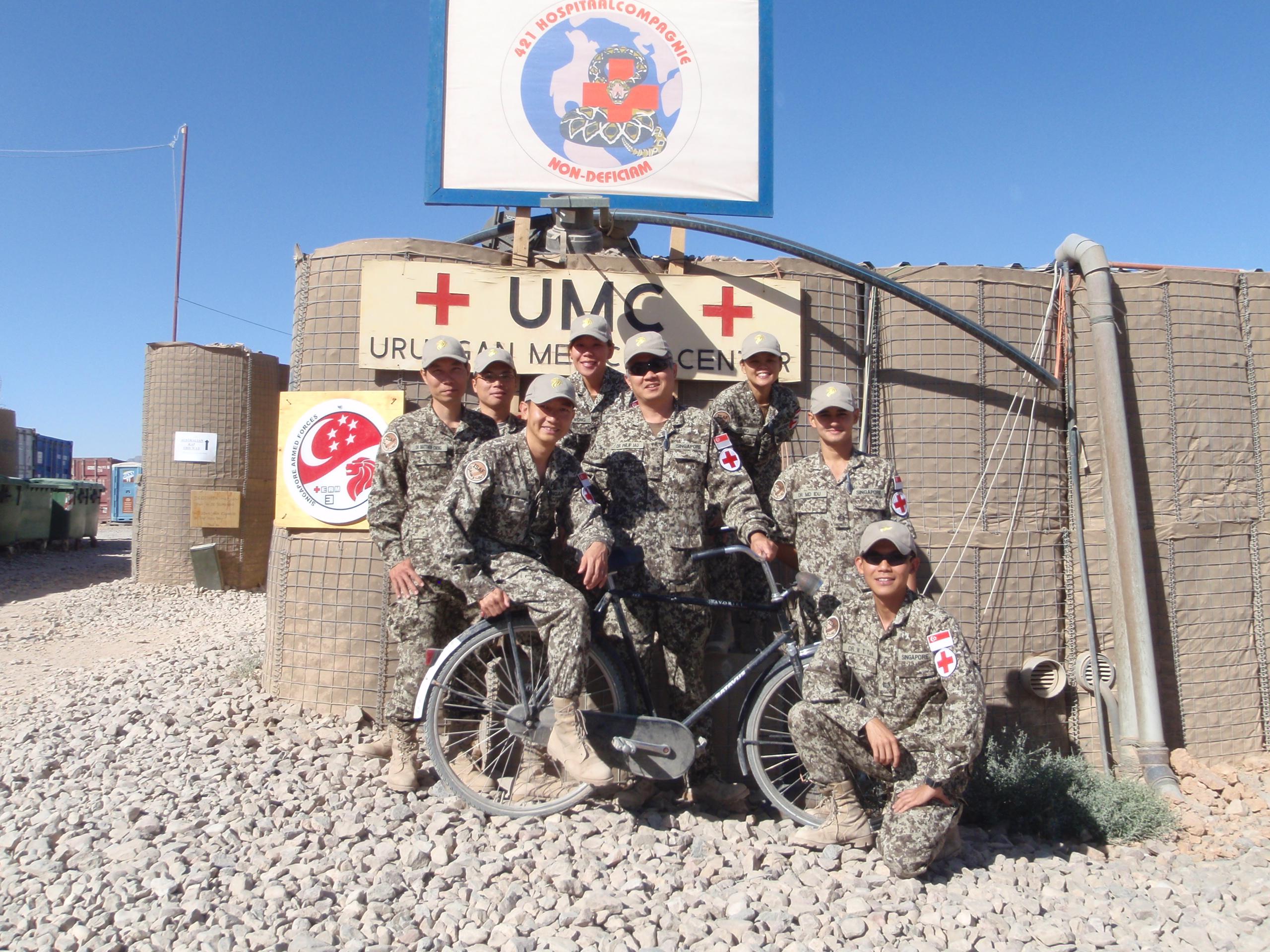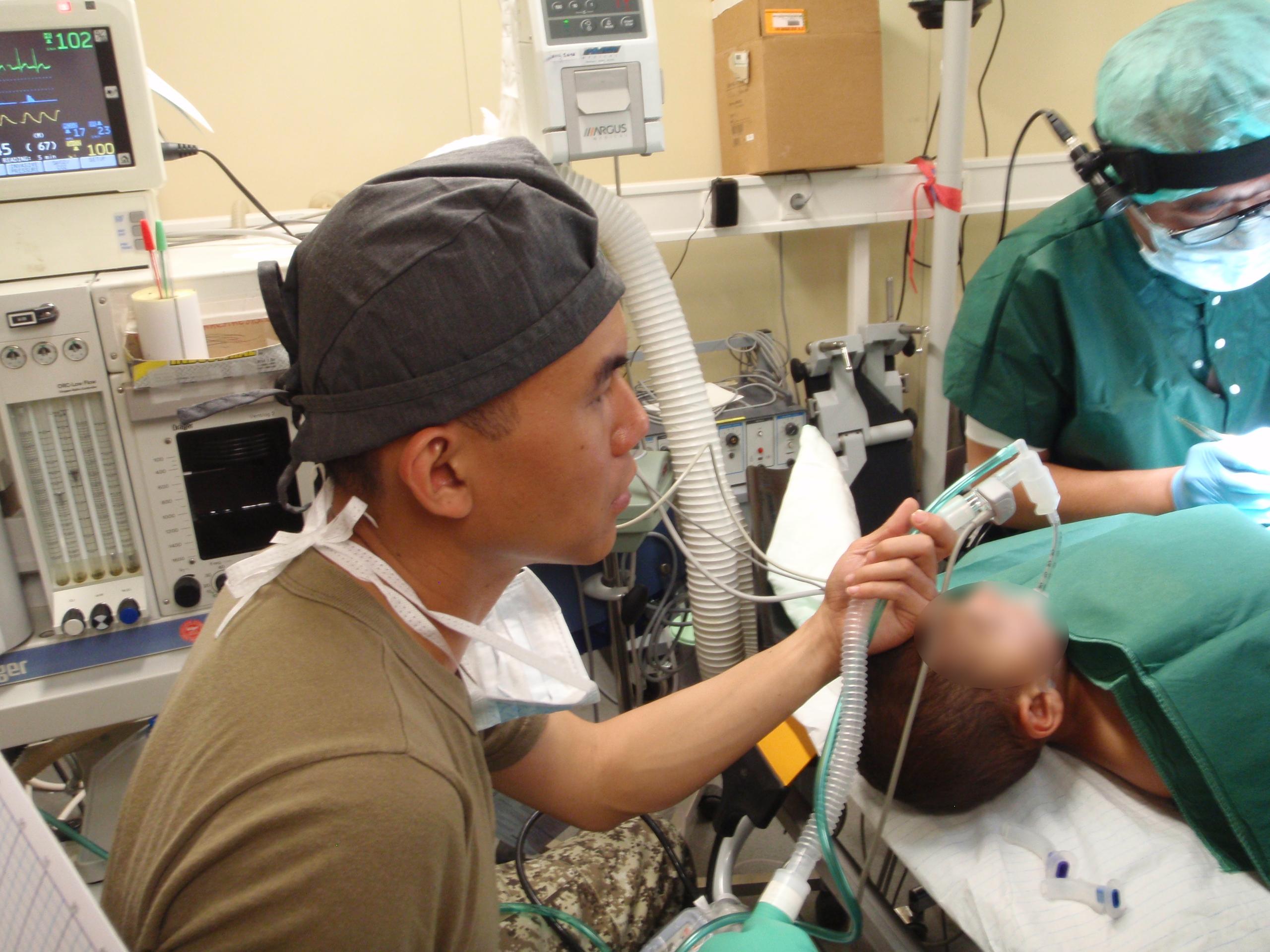
 Web Content Viewer
Web Content Viewer


As we commemorate NS55 this year, we spoke to MAJ (NS) (Dr) Tan Wah Tze, an NSman doctor who was deployed as part of Operation Blue Ridge (OBR) in Afghanistan in 2010. Over the 6 years of the Singapore Armed Forces’ (SAF) deployment in OBR, spanning from 2007 to 2013, we have contributed 492 personnel as part of the international effort to bring peace and stability to Afghanistan.
Hi Doctor, what do you do in your day job as well as for National Service (NS)?
I am Dr Tan Wah Tze, I am a Specialist in Anaesthesia and Intensive Care Medicine and a Visiting Consultant in the Department of Anaesthesia in Ng Teng Fong General Hospital. As an NSman, I was serving as the Officer Commanding (OC) of the Surgical Company of a Combat Support Hospital Battalion.

MAJ (NS) (Dr) Tan (front, kneeling) with the SAF Surgical Team
What were some of your responsibilities as a doctor during Operation Blue Ridge?
I was the Anaesthetist with the SAF Surgical Team deployed to Afghanistan in 2010 as part of Operation Blue Ridge. For the two months deployed in OBR, my day-to-day job involved putting the patients under anaesthesia so that they could undergo surgery and also manage the pain that they may have after the surgery.

MAJ (NS) (Dr) Tan hand ventilating a young child who is under anaesthesia for surgery
So how did you sign up for Operation Blue Ridge? Do you have any memorable stories/experiences from your deployment?
For OBR, I was asked by the then Chief Army Medical Officer (CARMO), who is my friend, whether I would like to volunteer to go as part of a surgical team because they required an anaesthesia specialist. As this is my specialist field, I said yes to the role.
Every single day was different and unique. Every injured person helped, and every new friend made was a memorable experience. To this day, I still keep in touch with the Dutch military medical team members, many with whom I have become friends. I am overall grateful for the experience.

MAJ (NS) (Dr) Tan (first row, second from right) and our SAF Surgical Team and their medical counterparts from the Netherlands Armed Forces
Can you recount some of the specific patients you have worked with?
Well, every patient was interesting. We had a range of patients. You have the Coalition soldiers who are injured and need to be treated, and then you have the civilians who are wounded and caught in the conflict and must be treated. For the civilian side, we usually see children and the elderly, the vulnerable groups of the population, and they tend to get caught in the middle. We have to give them the necessary treatment inside our military hospital. Some of the more heart-wrenching ones will be the children who are caught in the crossfire. We have one small little girl who was caught in a blast and injured her fingers and needed surgery for her fingers. She was crying uncontrollably. It was heart-wrenching, but fortunately, we were able to help her. Otherwise, it would have been very difficult for her to get meaningful help in that war-torn environment.

A young child who was caught in a blast, and required surgery for her fingers under general anaesthesia
What are some challenges faced during OBR, and how did you overcome them?
OBR was challenging as it was an austere military environment amid active conflict. To overcome some of the challenges, we undertook pre-deployment training with the Dutch military medical unit that was going to be with us. We also underwent our own SAF pre-deployment training.
From a medical/welfare perspective, what are the key impacts made by Our Army? (Eg. The number of patients treated, medical provisions distributed, etc.)
The key impact made by the SAF Surgical Team during OBR was that we reduced the burden of the medical system of the coalition forces by sharing the load. We had a professional surgical team capable of looking after the injured soldiers of the coalition forces and the injured civilians caught up in the conflict.

Military medical centre where our SAF Surgical Team was based
When you were in Afghanistan, did you personally encounter any fighting or bombings near where you were situated?
We did not have direct attacks on the base because we are in a very secure location within the base itself. But we did have indirect rocket attacks. In fact, it occurred quite a few times in the two months that we were there. This was the most dangerous part of our deployment, the indirect incoming rocket attacks on the base.

Guard tower at one of the gates leading into camp in Afghanistan
When you volunteered to go to Afghanistan, how did your family feel that you were going for this 2-month deployment?
Naturally, they were very worried because we were going into a dangerous place. But I reassured them that we would be given adequate training and there would be many safety protocols in place to ensure our safety. Having experienced conflict and seeing the chaos it caused to the civilian population, you will realise that it is very important to have a strong national defence to protect ourselves so that we will not see all these heart-wrenching situations within our own country.
How has your NS journey been thus far?
My NS journey has been a bit of a bittersweet experience, as with all things, it has ups and downs. However, I am grateful for the experience and exposure which I will never be able to get from any other organisation. It has been a great privilege to apply my civilian skills in a military environment to help fellow human beings. I also feel honoured to be given the opportunity to serve as a leader in the military organisation. I believe it is important that everyone who is eligible need to play their part and do their duty, as military defence is part of the Total Defence of Singapore.
Why did you decide to volunteer for Reservist on Voluntary Extended Reserve Service (ROVERS)?
I decided to ROVER because the job needed to be done. I was not looking at serving just a fixed number of years and finishing the obligation when the job is not finished. As long as the job needs to be done, I am there and willing to serve. Therefore I continued and ROVER beyond mandatory in-camp training (ICT).
So now that you have fully completed NS, looking back, would you have done the same things all over again?
The answer is yes; I would have. Because to me, at that point in time, I do not see it as something that is not worth doing. It was something that required me to use what I have learnt and know in civilian life to help others. Therefore, I feel it is quite natural to continue serving as long as the need and requirements are there.
Being an NSman and serving ICTs is an important part of life as a male citizen of Singapore. I must confess that I did feel a bit lost initially when I completed my NS obligations and no longer have to go back for ICTs. It has been so much a part of my life since the age of 18. NS is part of the Total Defence of Singapore, so every eligible person must contribute their part without exceptions. It is good that the government recognises the contributions of NSmen and shows its appreciation in this year of NS55. However, I think we can and should do more to show that we appreciate and value the contributions of all who serve.
This year is NS55. Having gone through full-time NS, 10 years of ICT and years of ROVERS, do you have any advice to share with future NSF and NSmen?
I think the most important thing for every NSF and NSmen is that you should go in with a positive mindset and try to make the best of it. You are serving with fellow Singaporeans and you have a shared experience with everybody. Value the friendships made during your time of service.
Written by: LCP Scott Pang (Army News)
Photos contributed by: MAJ (NS) (Dr) Tan Wah Tze
